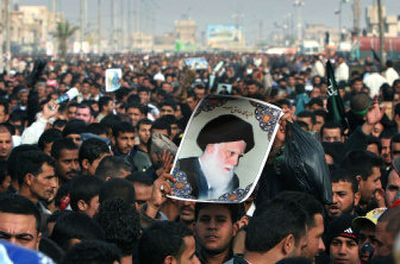Iraqi election withstands interference by militias

BAGHDAD, Iraq – Kurdish and Shiite factional militias and other armed men blocked voters from polling sites in scattered locations during Iraq’s national elections, Iraqi and U.S. officials said Friday. While the intimidation likely was not serious enough to influence the outcome of Thursday’s vote, one U.S. diplomat said, the overt militia role was a dangerous trend in Iraqi politics.
“This should not grow,” the diplomat, who spoke on condition of anonymity, told reporters in Baghdad. It was the latest of several U.S. warnings to the transitional government and political parties about the escalating role of party-linked militias. “This must be contained.”
Iraqi army trucks, escorted at times by U.S. military helicopters, carried ballot boxes to election centers around the country Friday, the last day of a three-day security crackdown imposed for Thursday’s National Assembly elections. Some election officials tentatively estimated there had been a 70 percent turnout for the vote, in which there was large-scale participation by Sunni Arabs for the first time since U.S. forces overthrew Saddam Hussein in 2003.
An Iraqi election commission official, Ezzedin Mohamady, said 178 election complaints had been received so far, 35 charging “violent interference” by officials. The U.S. diplomat said all sides had lodged complaints. He said the reported incidents in which militias either entered polling places or blocked would-be voters, who evidently were suspected supporters of opposition parties, “absolutely” had occurred.
Both the Kurdish and Shiite blocs in the current transitional government maintain private militias of thousands of armed fighters. Officially outlawed, the militias are occasionally given new designations as units of Iraq’s security forces or their members are nominally absorbed into the national police or army.
The militias – initially guerrilla forces of anti-Hussein Kurdish and Shiite opposition organizations – surged in numbers in the security vacuum brought by the collapse and disbanding of the Iraqi army and the inaction or inability of stretched-thin U.S. forces to stop them. The Shiite-Kurdish coalition government and Shiite religious parties have given only lip service to neutralizing the militias, even as U.S. forces are handing over security responsibilities in many southern Shiite and northern Kurdish cities where the militias have been prominent.
The complaints about militia interference in the elections came from mixed Kurdish-Arab cities in the north and from the heavily Shiite south, the U.S. diplomat said.
It is time for parties “saying they want democracy and saying they are believers in the democratic process to act like it,” the diplomat said. “That means they need to rein in their zealots.”
The new government born out of Thursday’s elections will have to confront the militias in 2006, the diplomat said.